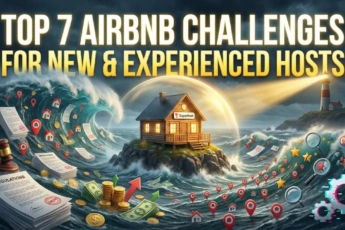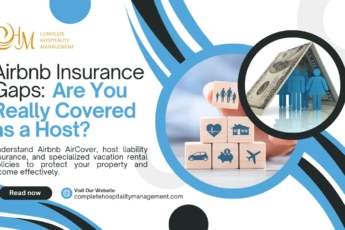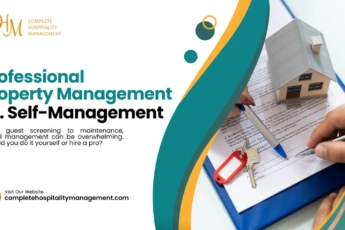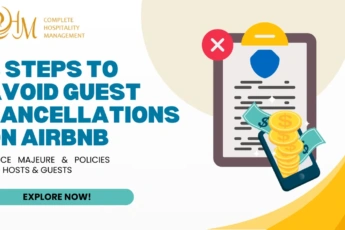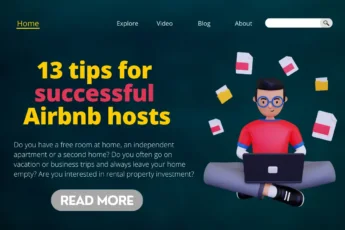How to Start Airbnb Business in 2026 – 8-Step Startup Checklist
A well-known website Airbnb allows travelers to locate distinctive and reasonably priced lodgings everywhere. There are several steps you may take to launch your Airbnb business. This article will give you a step-by-step tutorial on how to start Airbnb business and make it profitable.
Guidance on how to start
an Airbnb business
We have identified eight main steps. Depending on your knowledge and practical skills in hospitality management, this number may increase or decrease. Each step has many sub-points, but this is the only way to detail the entire process of starting a business on Airbnb and not miss anything.
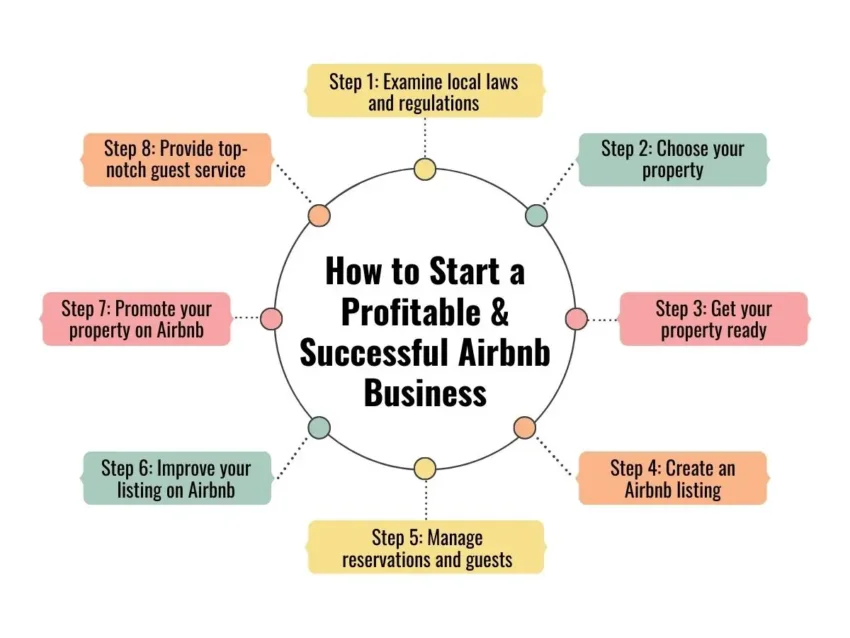
How to Start Airbnb Business in 8 Steps
1. Examine local laws and Airbnb regulations
To start an Airbnb business, you must complete this step. The legal requirements in your area, which might differ significantly depending on where you are, must all be followed. Here are a few crucial points:
- Rules for short-term rentals. In addition to safety and insurance regulations, they may include licenses, permits, fees, and tax requirements. It’s crucial to ensure you take all the necessary precautions to rent your property legally.
- Zoning rules. Residential premises may be prohibited for short-term rentals in some places. Ensure you know the zoning regulations in your area and whether short-term rentals are permitted there.
- HOA (homeowner association) regulations. You should confirm whether there are any regulations or limits regarding short-term rentals if your property is a part of the HOA. While some HOAs forbid entirely short-term rentals, others might have particular guidelines for hosts.
- Insurance: Although hosts are given some insurance protection through the platform like AirCover, evaluating your personal insurance policy is still advisable to ensure you have sufficient protection. To protect yourself and your assets, consider getting homeowners and liability insurance.
- Accessibility: Think about adding grab bars to the restroom or wheelchair ramps to your property to make it accessible to guests with disabilities.
- Tax repercussions. You may be subject to income, sales, and occupancy taxes if you rent out your home on Airbnb. Ensure you comprehend everything and how to pay and report any of them properly.
You can make sure you’re running your Airbnb business lawfully and prevent potential penalties or legal difficulties by researching and understanding your local rules and regulations.
2. Choose a property to rent out on Airbnb
The next step is to select an accommodation to list on Airbnb. This action will significantly impact your Airbnb business’s success. When selecting a property, keep the following in mind:
- Location. Your occupancy rate and nightly pricing are impacted. Consider homes in sought-after neighborhoods, close to major transportation hubs, or in well-known tourist regions.
- Property type. You can decide whether to rent out a spare room in your house, a second home, or an investment property. It should suit your objectives and way of life because each one has advantages and disadvantages of its own.
- Size of the property. Your occupancy rate and the nightly rate you can charge will be impacted by your property’s size. Take into account homes that are sizable enough to fit your target audience comfortably.
- Property condition. Your accommodation should be well-kept and in decent condition. Be sure to account for any improvements or repairs that could be required to get your property ready for Airbnb guests.
- Amenities. Offering amenities can draw guests and improve their experience. Some examples are free Wi-Fi, a fully functional kitchen, plush mattresses, and amenities.
Select a property that satisfies the needs of your target market as well as your own aims and lifestyle. Always do your homework before deciding on a property to ensure it will provide guests with a distinctive experience.
3. Prepare your property for rental
You must have your property ready for guests once you choose. And probably this is the most expensive step. Here are a few crucial points to think about.
Points to consider when preparing a property for guests
| Key consideration | Description |
|---|---|
| Cleaning | Thoroughly clean and disinfect all surfaces, with special attention to the kitchen, bathrooms, and common areas. |
| Decluttering | Remove any personal items that may annoy or crowd your guests, creating a clean and comfortable space. |
| Improvements and Repairs | Perform any necessary repairs and improvements, such as repainting walls, replacing lightbulbs, and installing new furnishings or amenities. |
| Facilities and Furniture | Provide functional and comfortable amenities such as luxurious linens, towels, and extras like a coffee maker or smart TV. |
| Health and Safety | Ensure that your property meets all health and safety requirements, including first aid items, safe drinking water, and smoke alarms. |
| Communication | Provide clear instructions for guests on how to use appliances, find items, and follow any rules or regulations during their stay. |
| Emergency Preparedness | Have a plan in place to quickly address emergencies or unexpected situations, such as power outages or plumbing issues. |
| Insurance | Consider investing in insurance to protect yourself and your property from any accidents or damages caused by guests. |
Setting up your property to suit their demands. This will promote favorable evaluations and repeat reservations. Don’t forget to provide a warm and inviting atmosphere to make anyone feel at home.
4. Create an Airbnb listing
Your listing is a chance to highlight your home and draw in prospective guests. Here are a few pieces of advice:
- Title and description. They should appropriately summarize your property and draw attention to its distinctive qualities. Choose keywords attentively to make your listing appear in needed search results.
- Photos. Having high-quality ones is essential to lure potential guests. Take images that clearly show off the best aspects of your property in well-lit conditions. Provide pictures of every room as well as any amenities you provide.
- Pricing. It has an impact on your occupancy rate and profitability. Consider location, size, and facilities. Incentives for bookings made during busy times or for more extended stays are also possible.
- Domestic regulations. To make sure that guests understand them, state them in clear terms. These could include rules on noise, smoking, and animals.
- Check-in & check-out processes. Give it specific instructions. This will make your guests feel secure and at ease while they are with you.
- Guest interaction. Inquiries from guests should be answered quickly, and clear and valuable communication should be provided during the booking process. By doing this, you’ll be able to build rapport and trust with your guests.
Make a detailed and enticing listing. To make everyone feel confident and at ease during their stay, don’t forget to provide accurate information, high-quality images, and straightforward communication.
5. Manage Airbnb reservations and guests
When you start the Airbnb business, don’t forget to deliver first-rate customer service and take care of your customers’ needs. We recommend you to keep the following in mind:
Major things to follow when managing reservations
| Key point | Description | Level of importance |
|---|---|---|
| Communication | Respond quickly to questions and booking requests, and provide clear check-in and check-out procedures and other important information. | High |
| Availability | Ensure that you are accessible to guests and provide a way for them to contact you if needed. | High |
| Maintaining and Cleaning | Keep your property tidy and well-stocked with necessary supplies. | High |
| Reviews and Comments | Encourage guests to leave feedback and reviews, which can help you identify areas for improvement. | Medium |
| Dealing with Problems | Address any issues that arise promptly and courteously, and be willing to offer refunds or make other arrangements if necessary. | High |
| Legal Requirements | Be aware of any local laws or regulations that may apply to hosting guests, such as obtaining necessary permissions or paying taxes. | Medium |
Offer top-notch customer service and manage your client’s needs. Always remember to speak effectively, offer a spotless and well-kept property, and deal with any problems as soon as they arise.
6. Improve your listing on Airbnb
You may keep enhancing your listing and increasing your revenue as you gain knowledge and hear from guests. When optimizing it, keep the following points in mind:
- Pricing. Review your pricing plan frequently, and make necessary adjustments to your prices. Consider elements like supply and demand, and seasonal variations.
- Features and amenities. This can entail selling premium bedding, offering free food and beverages, or setting up smart home technologies.
- Listing improvement. Do it consistently to raise its performance. Improve your description, upgrade photographs, or experiment with various pricing plans.
- Promotion and marketing. Use email marketing, social media, etc. You can attract more guests by working with nearby businesses or providing referral bonuses.
- Guests’ reviews. Keep track of the feedback you receive to spot areas for improvement. Respond to frequent grievances or include new facilities that guests ask for.
Upgrade your listing and strengthen your performance. If you have any additional questions about optimization, account setup, etc., you can contact us and be sure to get answers and help from experts with over 10 years of experience!
7. Promote your property on Airbnb
To increase your occupancy and revenue, you have to market your property. Here are some pointers to make this phase more effective:
- The internet. Promote your listing on social media sites like Facebook, Instagram, and Twitter to attract new guests. Provide detailed images and written descriptions of your location, along with any unique offers or discounts you’re now running.
- Travel booking websites (OTA). Consider adding your property to other OTAs like Booking.com or Expedia to attract a larger audience. Or you can consider our managing services, and your property will be listed in 35+ OTA channels.
- Rewards for referrals. Provide it to guests who recommend their family or friends to your listing. This can involve offers for future hotel stays or other benefits.
- Local collaborations. You might work with nearby companies to provide bundles or specials to their clients. For instance, you may offer customers who stay at your home a discount at a local restaurant or tourist destination.
- Email promotion. Get email addresses from previous guests to your resort, then utilize email marketing to advertise further bookings or exclusive deals.
- Paid promotion. Consider investing in paid advertising on websites like Google Ads or Facebook Ads to reach prospective guests looking for accommodations in the region.
Keep an eye on the success of your marketing initiatives and tweak your plan as necessary. Evaluate each channel’s return on investment (ROI) frequently and concentrate on the ones generating the most bookings and money.
8. Provide top-notch guest service
When you start an Airbnb business, its success depends on the ability to deliver exceptional guest experiences, just like in any other hospitality industry.
Main points for providing excellent service
| Point | Explanation |
|---|---|
| Communication | Be as specific as you can. Respond quickly to inquiries from guests, offer thorough directions for check-in and check-out, and stand ready to address any issues. |
| Cleanliness | Check your property is tidy and maintained before every guest. |
| Comfort | Provide a welcoming environment by offering top-notch linens, towels, flowers to feel welcome, etc. |
| Local Suggestions | Provide your guests with a list of nearby restaurants, attractions, and other areas of interest. |
| Guest Opinions | Urge guests to give it to you. Identify what you can modify, enhance, or add using this feedback. |
You can build a solid reputation by giving your guests a first-rate experience. Remember to be explicit in your communication, create a tidy and welcoming environment, and provide local recommendations and lovely comments.
Costs of running Airbnb business
Any business has both costs and profits. Below are the most common ones to run an Airbnb business.
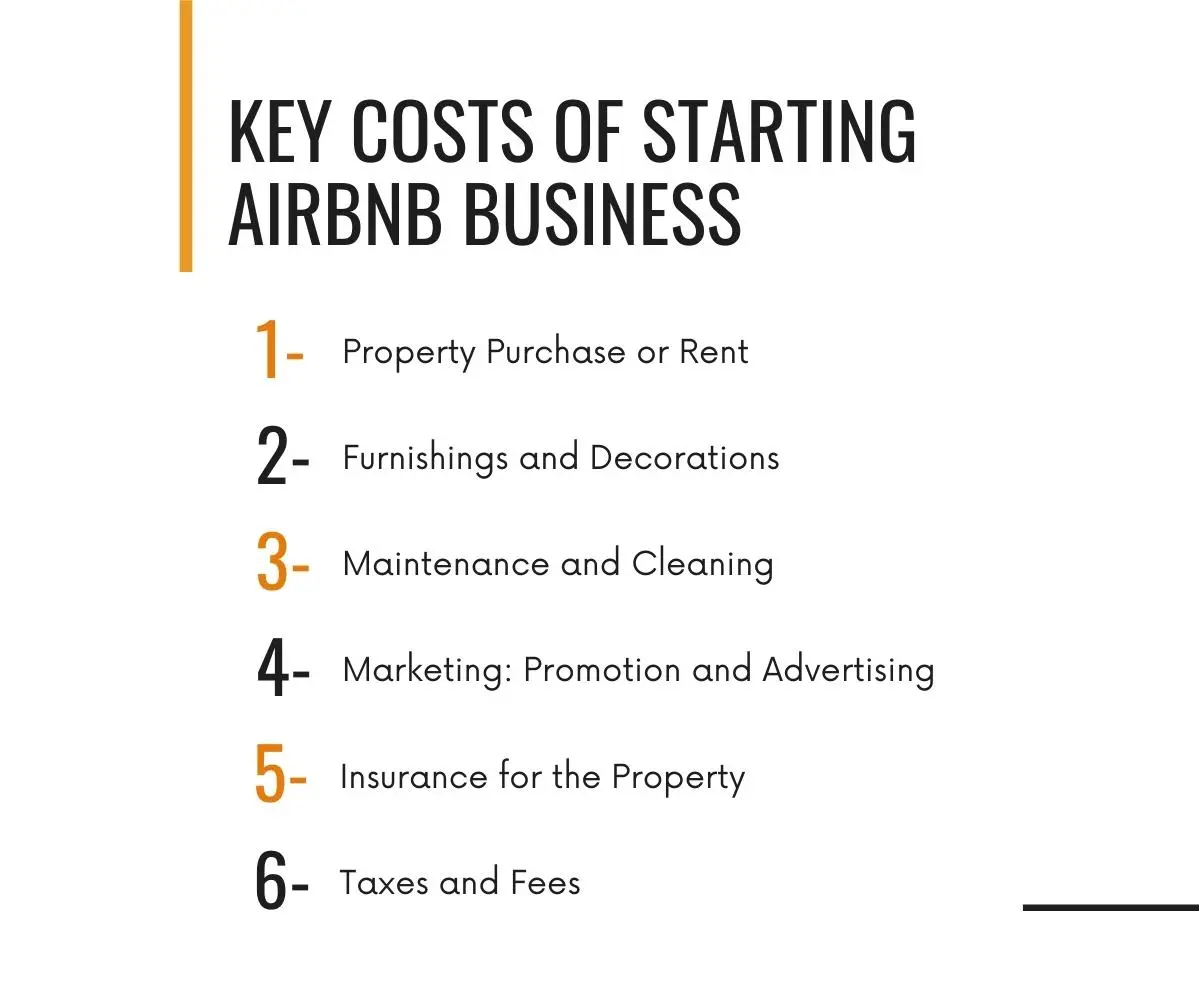
Key Costs of Starting Airbnb Business
Here are instances of variable and fixed expenses. The first ones change depending on the activity level, whereas the second ones stay the same.
Common expenses for an Airbnb business
| Fixed expenses | Variable expenses |
|---|---|
| Mortgage or rent payment for the property | Cleaning and maintenance costs (cleaning fees, repairs, supplies) |
| Property taxes | Furnishing and decor (bedding, furniture, towels, kitchen equipment) |
| Insurance | Airbnb service fees (commission, payment processing fees) |
| Utility bills (electricity, gas, water, internet, cable TV) | Consumables (toilet paper, paper towels, soap) |
| Advertising and marketing fees (professional photography, online listing fees) | Amenities (snacks, drinks, toiletries) |
| Property management fees | Staffing expenses (if employing staff for cleaning, check-ins, etc.) |
| Legal fees | Taxes (income tax, occupancy tax, sales tax) |
| Accounting fees | Capital improvements (renovations, upgrades to the property) |
Example of expenses calculation
to run Airbnb business
Let’s assume you are an Airbnb host who rents out a two-bedroom apartment in New York City for $200 per night. You rent the apartment for $2,000 per month. For instance, you rent out the apartment for 20 nights per month (a 67% occupancy rate).
Airbnb Business Expenses Example
| Fixed Expenses | Variable Expenses |
|---|---|
| Rent: $2,000 | Cleaning and Maintenance: $1,000 |
| Property Taxes: $500 | Furnishing and Decor: $500 (one-time cost) |
| Insurance: $200 | Airbnb Service Fees: $400 |
| Utilities: $500 | Consumables: $200 |
| Advertising and Marketing: $300 | Amenities: $100 |
| Property Management: $200 | Staffing: $200 |
| Legal Fees: $100 | Property Upgrades and Repairs: $300 |
| Accounting Fees: $150 | City Taxes and Fees: $100 |
| Total: $4,050 | Total: $2,800 |
Your total expenses (fixed plus variable) are $6,400. This means that to break even, you would need to generate at least this sum in revenue from your Airbnb bookings each month. Any revenue beyond that would be profit.
Tips when listing a property
on Airbnb platform
We suggest paying attention to the next crucial points you should constantly consider when listing your property on Airbnb. Save them and use them actively so that your business will definitely become successful.
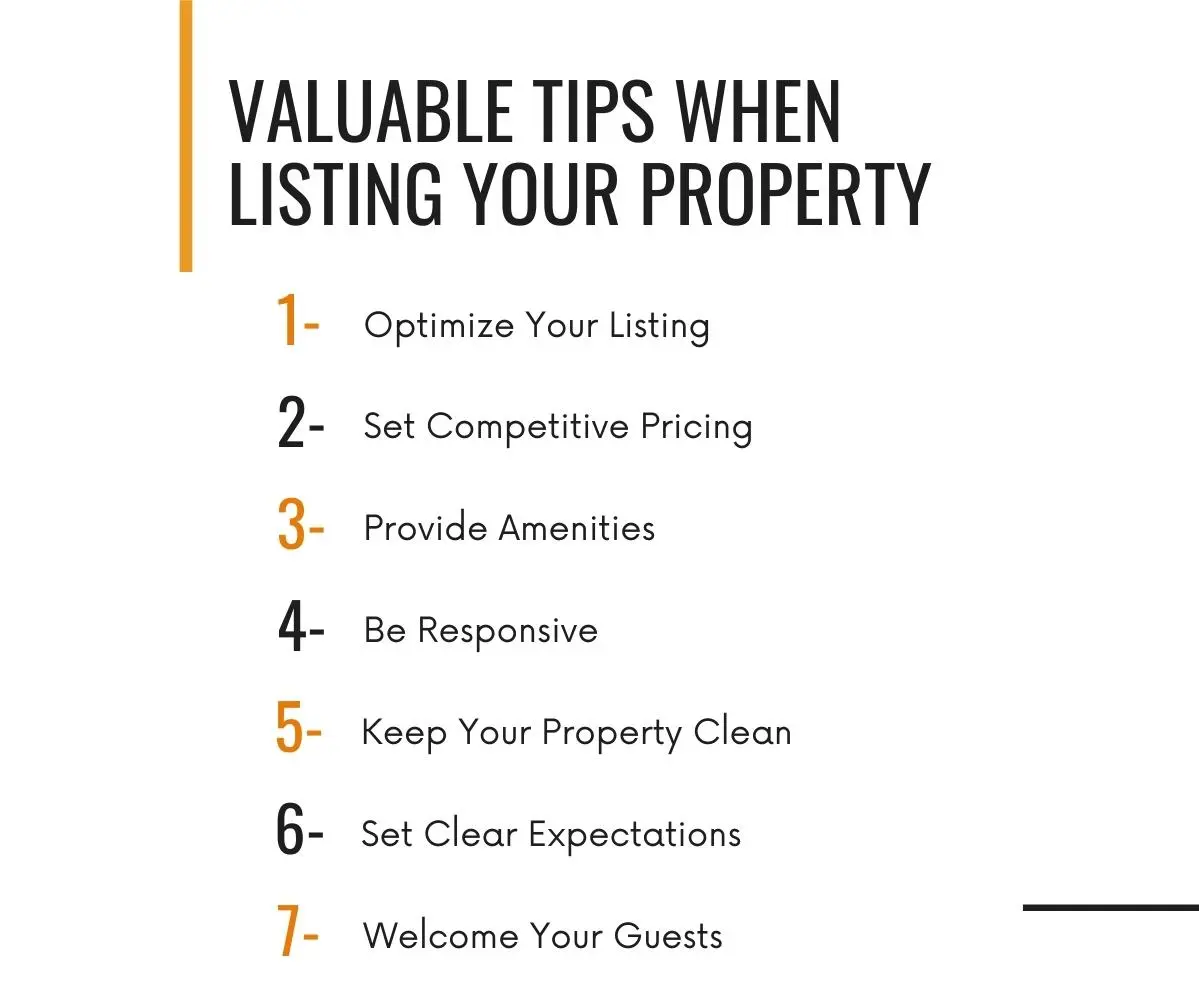
Valuable Tips for Listing Property on Airbnb
Details on each of the Airbnb tips:
- Use superb images and create a precise description of your property to enhance your listing. Draw attention to its distinctive qualities, such as a breathtaking vista or a cozy fireplace.
- Establish competitive pricing. To make sure your rates are reasonable, check the prices of comparable Airbnb rentals in your neighborhood. Discounts for extended stays or recurring visitors should be considered.
- Evaluate what amenities you may offer to make your visitors’ stay more comfortable before providing them. This can entail offering fresh towels, amenities, and a fully supplied kitchen.
- Be responsive. React quickly to messages and inquiries from guests. This will enhance the likelihood of favorable ratings and help establish confidence.
- Maintain your property. Ensure your property is kept tidy and in good condition. If required, engage a specialized cleaning service.
- Set clear expectations, regarding check-in and check-out procedures, house regulations, and any other significant information your visitors need to be aware of.
- Introduce your guests. Give them a warm welcome by saying hello in person or leaving a thoughtful message or gift. This will make their stay more enjoyable.
Can’t undertake the chore of maintaining, cleaning, coordinating reservations, and addressing multiple guests at once across numerous homes alone? We are ready to provide you with a service like co-hosting to help lighten part of the weight. Look at our list of co-host services, and feel free to trust us with your property!
As a conclusion
Although it needs considerable planning and preparation, the decision to start Airbnb business may be a lucrative and gratifying investment. Following these steps, you may build a lucrative Airbnb business offering customers a distinctive and pleasurable experience.
Frequently asked questions related to
starting Airbnb business
1. How much do Airbnb owners make?
The amount of money that Airbnb hosts make might differ significantly based on a lot of variables, including the property’s location, type, amount of guests, and seasonality of demand.
The average monthly income for Airbnb hosts ranges from a few hundred to several thousand dollars. According to Earnest.com, the typical Airbnb host makes $924 per month. Perhaps, this amount can differ significantly based on the location and other factors.
It’s crucial to remember that there are other expenses related to hosting, including cleaning fees, maintenance expenditures, and taxes. Local taxes and restrictions may also affect how profitable an Airbnb listing is.
2. Is an Airbnb profitable?
The success of Airbnb will depend on careful planning, successful marketing, and sound management techniques. When considering whether to invest in an Airbnb rental property, it is crucial to take into account all the variables including location, seasonality, competition, property type, occupancy rate, and operational costs.
While some Airbnb stays can be quite profitable, others can find it difficult to break even.
3. What percentage does Airbnb take from the owner?
Although it might vary from 0% to 5% for some listings, typically, Airbnb charges around 3% per booking from the owner. It also can charge hosts some extra fees like cleaning and professional photography.
Airbnb also levies a service fee to guests, and it varies from 0% and 20% of the booking subtotal. It varies based on various factors, such as the overall cost of the reservation and the number of nights.
4. How to start investing in Airbnb?
There are a few ways you can invest in Airbnb:
- Buy Airbnb Stock;
- Invest in Airbnb Real Estate;
- Invest in an Airbnb REIT.
Note that it is important to thoroughly research and understand the risks involved before investing in Airbnb. It may also be helpful to consult with a financial advisor.
5. How much does it cost to run Airbnb?
The cost of running an Airbnb can vary widely. It depends on location, property size, level of amenities, provided services, etc. Here are some examples:
- Listing fees (typically around 3%);
- Cleaning fees;
- Maintenance and repairs;
- Utilities;
- Property taxes;
- Insurance of Airbnb property;
- Decorations;
- Marketing and advertising.
Overall, the cost of running an Airbnb can be high, but it can also offer the potential for high returns if appropriately managed.
6. Is it hard to start Airbnb?
While starting an Airbnb rental can take some time and effort, it is not always challenging. Many hosts consider it to be a fulfilling and successful endeavor. It is crucial to conduct your homework, grasp the fees and legal requirements involved, and be ready to do the necessary work to succeed.
7. How do I start an Airbnb business with no money?
Starting an Airbnb business with no money can be challenging. Here are some tips:
- Use existing resources (a spare room or property you can rent out);
- Offer unique amenities (free breakfast, a bike rental, or a local guidebook);
- Try free marketing channels (social media and word of mouth);
- Do everything yourself;
- Partner with other hosts.
Starting an Airbnb business with no capital can be a viable option for those willing to be creative and resourceful.
8. Can anyone run an Airbnb?
Anyone can launch an Airbnb business as long as they have a rental property and follow local regulations. To ensure that it is a good fit for your skills, way of life, and goals, though, is essential.
Updated on: . Author:

